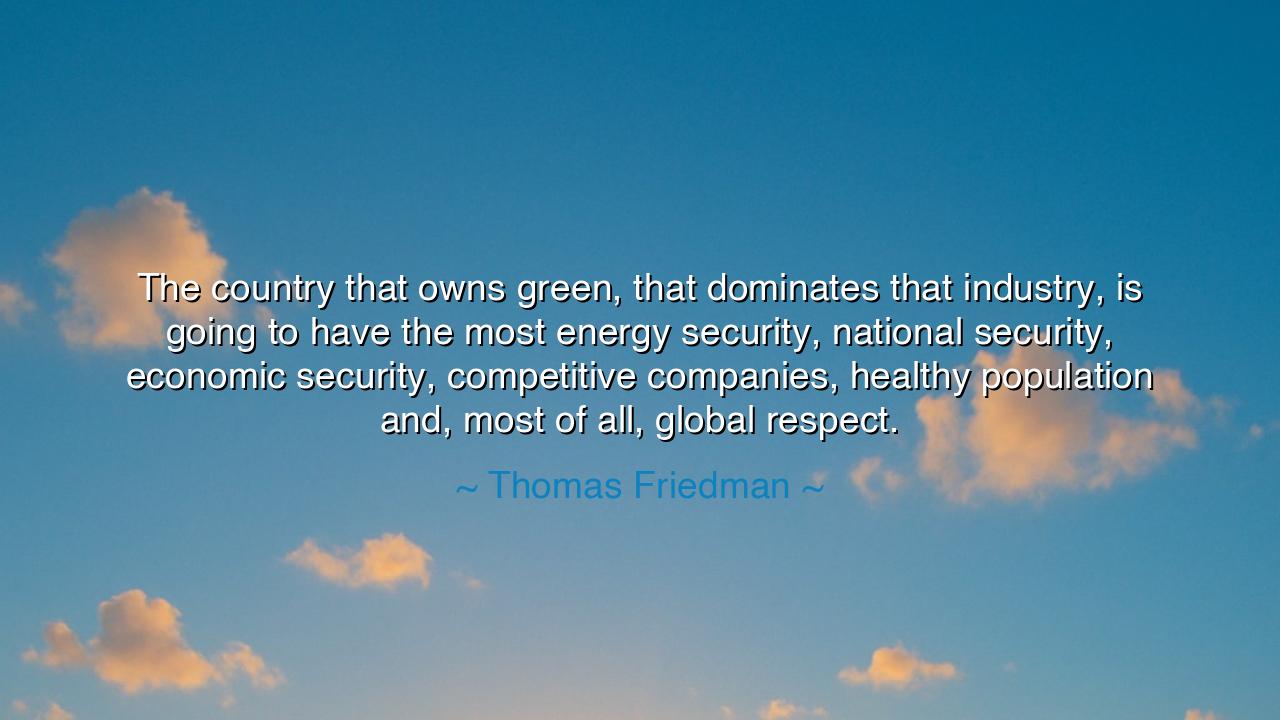
The country that owns green, that dominates that industry, is
The country that owns green, that dominates that industry, is going to have the most energy security, national security, economic security, competitive companies, healthy population and, most of all, global respect.






Hearken, O children of the Earth and heirs of creation, to the words of Thomas Friedman, who declared: “The country that owns green, that dominates that industry, is going to have the most energy security, national security, economic security, competitive companies, healthy population and, most of all, global respect.” In this vision lies both a prophecy and a warning—a call to those who lead nations and those who labor within them. Friedman’s words speak of the dawning of a new age, where green energy and sustainability are not mere ideals, but the pillars upon which the strength, safety, and honor of civilization will rest.
From the earliest days of humanity, power belonged to those who mastered the sources of energy. The tribes that learned to harness fire shaped the dawn of civilization. Those who tamed wind and water built ships that bridged continents. In the modern age, nations rose upon coal and oil, forging empires from the black veins of the earth. But now, as the world stands trembling before the storm of climate change, Friedman’s declaration calls to the wise: the future will belong not to those who dig deeper into the earth’s decay, but to those who cultivate the power of renewal—the green flame of sustainability.
Consider the example of Denmark, a small nation that turned its face toward the wind. In the aftermath of the oil crises of the 1970s, while many clung to fossil dependence, Denmark invested in wind energy, transforming adversity into innovation. Today, it stands as a global leader in clean technology, exporting knowledge and turbines to the world. Its people breathe cleaner air, its industries thrive on innovation, and its influence far exceeds its size. Thus we see the truth of Friedman’s words: to own green is to own the future.
But this truth is not merely political—it is moral. The pursuit of green energy is not only about power or profit; it is about stewardship, the sacred responsibility to protect the earth that shelters us. The ancients revered the land as divine—whether in the worship of Gaia, the Egyptian reverence for the Nile, or the Native American belief that the Earth is a living mother. To pollute and waste is to dishonor this covenant. Friedman’s call is thus not only to innovation, but to reverence—to rebuild our civilizations in harmony with the natural order.
The wise understand that energy security is no longer found in the stockpiles of oil or the mines of coal, but in the brilliance of the sun, the breath of the wind, and the endless pulse of the tide. The nation that harnesses these forces will know freedom from dependence, strength in crisis, and respect among nations, for it will lead by example, shaping a new era of prosperity not born from exploitation, but from enlightenment.
The lesson here is both grand and personal. On the scale of nations, it urges leaders to invest in clean technologies, education, and innovation—to treat sustainability as destiny, not decoration. On the scale of the individual, it calls each of us to live as stewards—to conserve, to plant, to innovate in our own spheres. For the power of change begins not in governments, but in the hearts and habits of people who understand their unity with the earth.
Practical action flows naturally from this wisdom: support renewable energy, advocate for sustainable policy, consume with conscience, and teach the young that respect for the planet is respect for life itself. The strength of a country—and indeed of civilization—will no longer be measured by its armies or its oil reserves, but by its ability to sustain and protect the living world.
O seeker of understanding, remember this: the green age is the new dawn of humanity. Let the words of Thomas Friedman resound in your heart as a call to greatness: to master nature not through dominance, but through partnership; to find security not in walls or weapons, but in the vitality of the earth. For the nation that “owns green” shall not only prosper—it shall honor creation, lead with wisdom, and stand forever in the respect of the world and the blessing of time.






AAdministratorAdministrator
Welcome, honored guests. Please leave a comment, we will respond soon